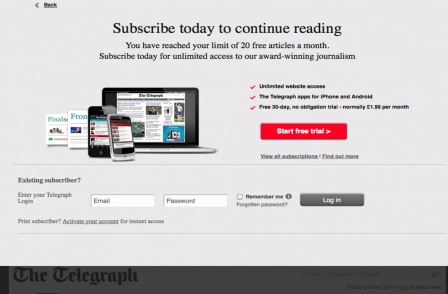
The first website figures for the Telegraph since it went behind a metered paywall suggest there is “no downside” to their approach.
This is the view of media analyst Douglas McCabe of Enders Analysis who suggested other publishers could now follow suit.
April was the first full month Telegraph.co.uk had set a 20-article limit for readers. After that is reached, readers are invited to take out a free trial subscription, and then a paid one (from a cost of £2 a week).
According to ABC, in April Telegraph.co.uk remained the UK’s third most popular national newspaper website with just over 3m unique browsers a day (up 5.8 per cent month on month).
Year on year it was up 29 per cent, which was a faster rate of growth than the fully free-to-air Guardian.
McCabe said: “It’s quite encouraging. Enders Analysis have been recommending for a couple of years that the right approach to this is a metered paywall. There’s almost no downside that we can see to this approach.
“The Telegraph demonstrates the point and this could be what everyone’s been waiting for,” adding that it could prove to be a “tipping point” in the ongoing debate over online paywalls for news publishers.
He said: “There’s no silver bullet to this but there might be 1,000 tweaks. We’ve been very impressed with the latest New York Times changes to their offering. They have a very low entry point but also a premium product at the other end of the scale.”
McCabe said another advantage of the metered paywall model was the increase in “knowledge and data” about readers which publishers gain – which can be used to improve both the commercial and editorial offering.
Meanwhile, Mail Online remained the UK’s most popular national newspaper website with 7.8m ‘unique browsers’ per day in April .
Looking at the monthly ABC totals, Mail Online reached 119m ‘browsers’, with Guardian.co.uk in second place on 82m, followed by Telegraph Media Group on 59m, The Sun (27.7m), Mirror Group (25.1m), The Independent (24.3m), Metro (9.8m)and the Evening Standard (3.9m).
Email pged@pressgazette.co.uk to point out mistakes, provide story tips or send in a letter for publication on our "Letters Page" blog
